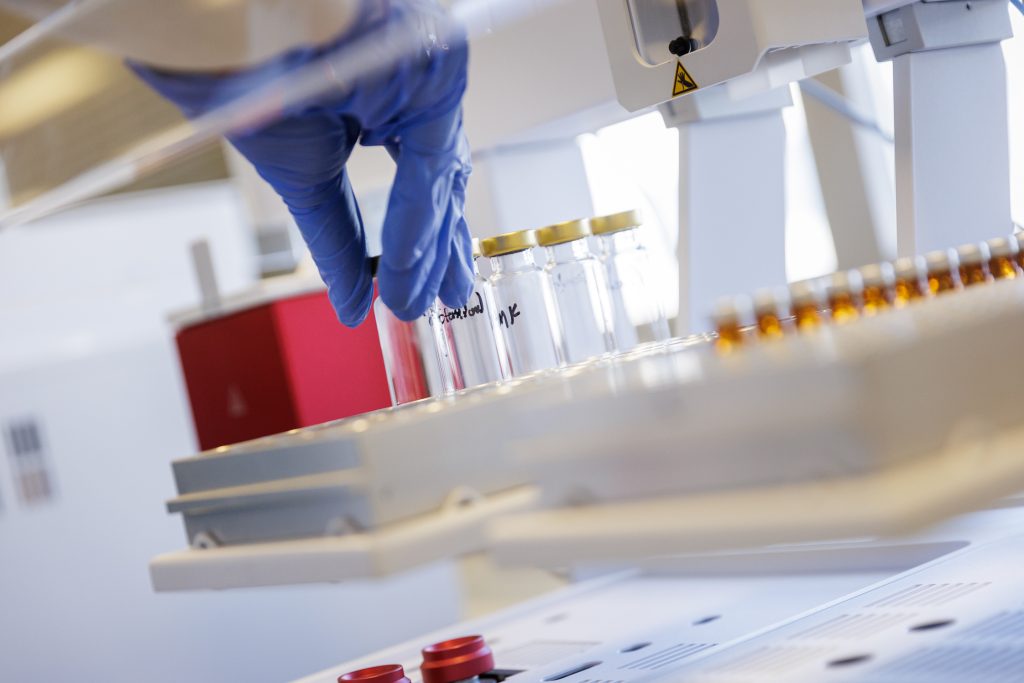Any manufacturing process must make the product correctly every time. It’s particularly important when making pharmaceuticals because of the level of regulatory oversight. Quite rightly, to ensure patient safety, there are strict rules about how products are made and how they need to be tested and analyzed to document that what leaves the factory meets all requirements. It is also necessary to prove that the medicines will maintain this quality level until expiration.
This is why it is essential to develop and validate analytical methods to support activities and functions such as process validation controls, stability tests, and dissolution profiles. Validation of these methods is essential to ensure they reliably give accurate results.
The importance of analytical testing
Analytical testing is an essential part of guaranteeing the quality, safety and effectiveness of pharmaceutical products. However, the process is not without its challenges, and it requires a proactive approach if both compliance and efficiency are to be maintained. One of the most significant challenges is keeping up with the changing regulatory requirements set by agencies such as the FDA, EMA and ICH. These bodies issue frequent updates to their guidelines, and remaining compliant requires an effective regulatory monitoring system to be in place, allied to continuous training, and the implementation of quality systems that align with current expectations.
Maintaining analytical instruments in optimal condition is equally important, as improper calibration or maintenance can compromise test results. A structured approach that includes a robust IQ/OQ/PQ (Installation, Operational, and Performance Qualification) program, routine preventive maintenance, and periodic performance verification helps ensure instrument reliability. Similarly, proper sample handling and storage are critical to preventing degradation or contamination. Validated stability-indicating methods, controlled storage conditions and well-trained personnel all contribute to maintaining sample integrity.
Another challenge laboratories often encounter is the availability of reagents and reference standards. Shortages or inconsistencies in these materials can directly impact test reproducibility. To mitigate this, it is essential to maintain an appropriately sized inventory, work with multiple suppliers, and regularly qualify them. Contamination and cross-contamination risks also require strict management through dedicated equipment and clearly defined cleaning protocols.
The human element plays a significant role in analytical testing, as variability between analysts can lead to inconsistencies. Standardizing methods, providing ongoing training and integrating automation wherever feasible can help ensure accuracy and reproducibility. Additionally, dealing with out-of-specification (OOS) and out-of-trend (OOT) results requires a systematic approach. Conducting thorough root cause investigations, using statistical trending tools and implementing corrective and preventive actions (CAPA) are key to resolving these issues effectively.

Validated Methods in Good Manufacturing Practice (GMP)
Once the R&D department has defined the final formulation and developed the analytical methods, a GMP analytical team takes over, validating those methods for the final product. Work is carried out according to current GMP protocols, strictly following all the relevant good manufacturing practices guidelines, and always ensuring data integrity.
Constant communication with other departments, including R&D, regulatory affairs and clinical, is essential. Close collaboration between departments allows for the transfer of insights and knowledge about the final formulation, the final analytical methods, and the results concerning the investigational medicinal products (IMPs) or validation batches.
Another key area of focus is the validation and transfer of analytical methods between laboratories or manufacturing sites. Any misalignment in these processes can lead to inconsistencies, making it crucial to follow ICH Q2(R2) guidelines and maintain clear communication between teams. Additionally, data integrity remains a major compliance concern, with risks related to incomplete records, data manipulation or failure to adhere to ALCOA+ principles. To address these risks, incorporating audit trails and automated data capture systems can enhance reliability and ensure compliance.
Careful planning is required for the transfer of the analytical method back to the GMP manufacturing site or the CMO where the drug is being made, allowing their own QC departments to run the methods ahead of commercial batch release. Close contact is maintained with the manufacturing groups, and if there are any challenges with the implementation of the method, support is provided.
Patient safety is at the heart of all operations. Without a validated process, the product will not receive a licence. The methods need to be completely repeatable, giving accurate results every time.
Process Validation Controls and IMP Testing
Thorough process validation controls are carried out on the registration batches, ensuring that both the CMO and the regulatory team receive the results required for the product’s marketing authorization application. This process is fundamental for proving the reliability and consistency of the GMP manufacturing process, as well as for establishing the final product’s specifications, including critical quality attributes.
In the case of IMPs, all necessary testing is performed on bio batches to confirm the integrity and quality of the product intended for bioequivalence studies. Additionally, to meet the requirements outlined in the Guideline on the Investigation of Bioequivalence, in vitro dissolution tests are conducted as a complement to the bioequivalence studies.
These tests are critical to verifying that the product in clinical trials meets the required safety, efficacy, and quality standards. By ensuring the bio batches adhere to strict good manufacturing practices guidelines, the regulatory submission for bioequivalence studies is supported, which is key to demonstrating that the generic or new formulation performs similarly to the reference product in terms of pharmacokinetics and therapeutic effect.
This comprehensive approach ensures regulatory compliance, product safety, and consistent GMP manufacturing performance, paving the way for a successful market launch.
Stability Studies According to GMP Guidelines
Another essential task is evaluating the stability of the validation batches. Stability, according to International Council for Harmonisation (ICH) protocols, is closely followed to determine the shelf life of the product and define the storage conditions required to maintain its integrity. Again, all of this is carried out according to GMP guidelines. All these data are passed on to the regulatory affairs department, ensuring a smooth process during submission to the regulatory authorities.
Stability tests are designed to assess the percentage of the active substance throughout the product’s shelf life and provide insight into any degradation that may occur within the final dosage form. If degradation occurs, it must remain within the specified allowable limits. The cause of any degradation is also examined – whether it results from temperature, humidity levels, or interactions with any component of the container, closure, or packaging.
If the products require some form of preservative, its effectiveness in protecting against microbes is assessed. Additionally, it is determined whether the preservative interacts with any of the drug formulation components, whether active or excipient. For solid dosage forms, including capsules, tablets, or film-coated tablets, dissolution tests are conducted.
Any variations over time must be addressed. For example, are different storage conditions required? If degradation is observed at room temperature, refrigeration may provide a simple way to prevent it. Stability tests are crucial in determining the optimal storage conditions and the product’s shelf life.
During ICH stability testing, if required, the product’s stability is assessed in both upright and inverted positions of the container. This helps determine if the container’s closure system impacts the product’s integrity.
Additionally, for products in multidose containers, in-use stability studies are conducted at both the beginning and near the end of the shelf life to determine the exact usage period of the container.
Batch Release and GMP Status
The first validation batches allow for the evaluation of the GMP manufacturing process and its impact on product shelf life and storage conditions. Proving this ensures that the validated protocol can be followed consistently for the release of commercial batches.
The Greek authorities audit laboratories and procedures every three years, and frequent audits are conducted by clients – both before entering into contracts and after agreements are in place. Additionally, FDA readiness has been established through a proactive external assessment of quality systems. Any identified gaps have been addressed. This oversight is welcomed, as it ensures compliance with all regulatory requirements.
Time and cost constraints remain a constant challenge, as laboratories must balance efficiency with maintaining high-quality testing while managing expenses. Optimizing workflows through automation and reducing inefficiencies can help achieve this balance without compromising standards.
By identifying and addressing these challenges with strategic solutions, GMP analytical testing can continue to uphold compliance, efficiency, and accuracy ensuring that pharmaceutical products consistently meet the highest quality standards.

